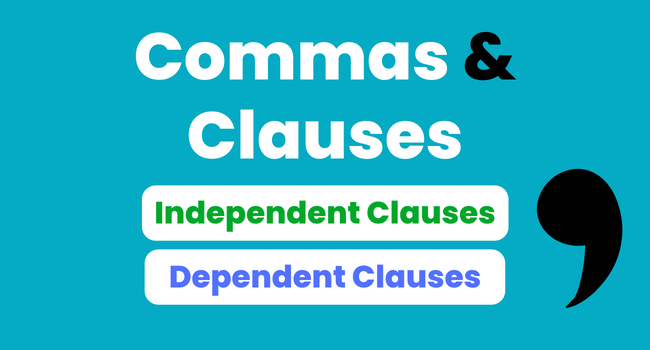
In today’s punctuation lesson, we will explore the usage of commas with clauses. You’ll learn how to use commas between independent clauses and how to use them with dependent clauses. This is a very important punctuation lesson.
What are Clauses?
A clause is a group of words that contains a subject and a verb. There are several different types of clauses.
- Example 1: “The boy ate pizza for dinner.”
- Example 2: “Dad is drinking coffee.”
Both of these are independent clauses that contain a single subject and a single verb.
Independent Clauses VS Dependent Clauses
Independent clauses are complete thoughts that can stand alone. They contain a subject and a verb and express a complete thought.
- Example 1: “I walked to the park.”
- Example 2: “She was hungry.”
- Example 3: “Jamie doesn’t play the guitar.”
A dependent clause is part of a sentence that contains a subject and a verb, but it cannot stand alone as a sentence.
- Example 1: “After I walked to the park”
- Example 2: “Because she was hungry”
- Example 3: “Although Jamie doesn’t play the guitar”
The above clauses do not form complete thoughts even though they contain subjects and verbs. They can’t stand alone as a complete sentence. They are dependent clauses.
Commas with Independent Clauses
Use a comma before coordinating conjunctions (and, but, or, so, for, yet, nor) when joining independent clauses.
- Example 1: “I walked to the park, and I saw a bunch of kittens.”
- Example 2: “She was hungry, so she ate a huge bowl of pasta.”
- Example 3: “Jamie doesn’t play the guitar, but he loves rock music.”
The above sentences each contain two independent clauses joined by a coordinating conjunction. We use a comma before the coordinating conjunction to connect them.
Commas with Dependent Clauses
Separate dependent clauses from independent clauses with a comma when the dependent clause comes first.
- Example 1: “After I walked to the park, I read my book by the pond.”
- Example 2: “Because she was hungry, she ate a huge bowl of pasta.”
- Example 3: “If Dave finishes his work on time, he will go to the party.”
Independent clauses followed by dependent clauses do not require a comma between them.
- Example 1: “I read my book by the pond after I walked to the park.”
- Example 2: “She ate a huge bowl of pasta because she was hungry.”
- Example 3: “Dave will go to the party if he finishes his work on time.”
Commas with Clauses Quiz
- She studied hard but she still didn’t pass the exam.
- After finishing his work he went for a walk.
- They arrived late so they missed the beginning of the movie.
- Although she was tired she decided to go to the gym.
- Jessica worked hard but couldn’t finish the project on time.
- We can go to a museum if it’s rainy on Saturday.
- When the bell rang the students rushed out of the classroom.
- The children invented a funny game to play at the park.
- The girls went to the park and they played a few games of basketball.
- Bernardo couldn’t find his keys because he misplaced them earlier.
Add commas where necessary to the following sentences. Watch my full lesson on commas and clauses on YouTube to see the answers to this quiz!

Leave a Reply